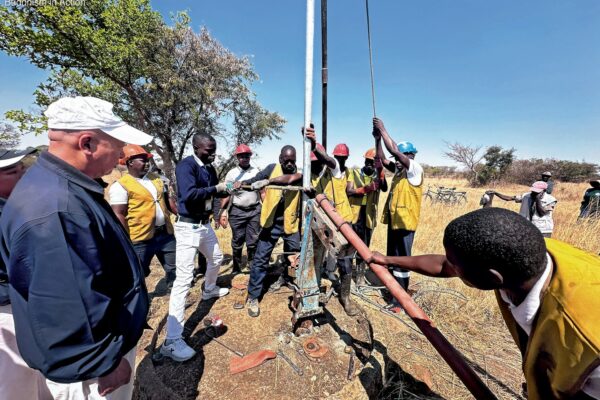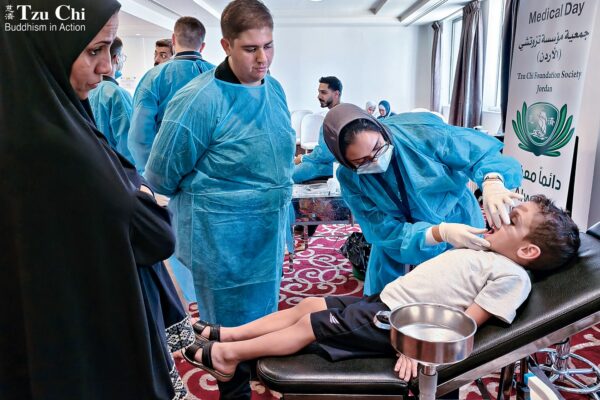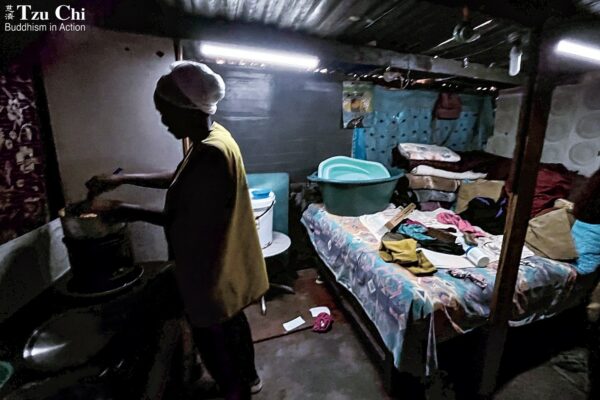By Shi Yu-fang
Edited and translated by Wu Hsiao-ting
Paralyzed by accidents, they used to spend their days in bed, staring at the ceiling and seeing no hope for tomorrow. Now they volunteer outside of their homes, bringing their courage and resilience to those they meet. Their powerful examples encourage others to overcome adversity.
November 21, 2021, was a special, joyful day for Zeng Qi-xiong (曾啟雄) and Jiang Yong-xu (江永旭). That was the day they both received their volunteer certifications from Dharma Master Cheng Yen. The two men are about the same age, just three years apart, but what gives them a special connection is that both are wheelchair bound and were once bedridden with spinal injuries. They were like snails, withdrawn into their shells. Those days were dark indeed. They saw no hope for themselves and no way out, struggling with depression and even contemplating suicide—that is, until Tzu Chi volunteers entered their lives. It was those volunteers that encouraged them and helped them turn their lives around.
“If you want to see yourself change,” said Zeng Qi-xiong, “maybe Tzu Chi is just the place for you!”
Jiang Yong-xu chimed in, “I told myself, ‘If others can do it, so can I!’”
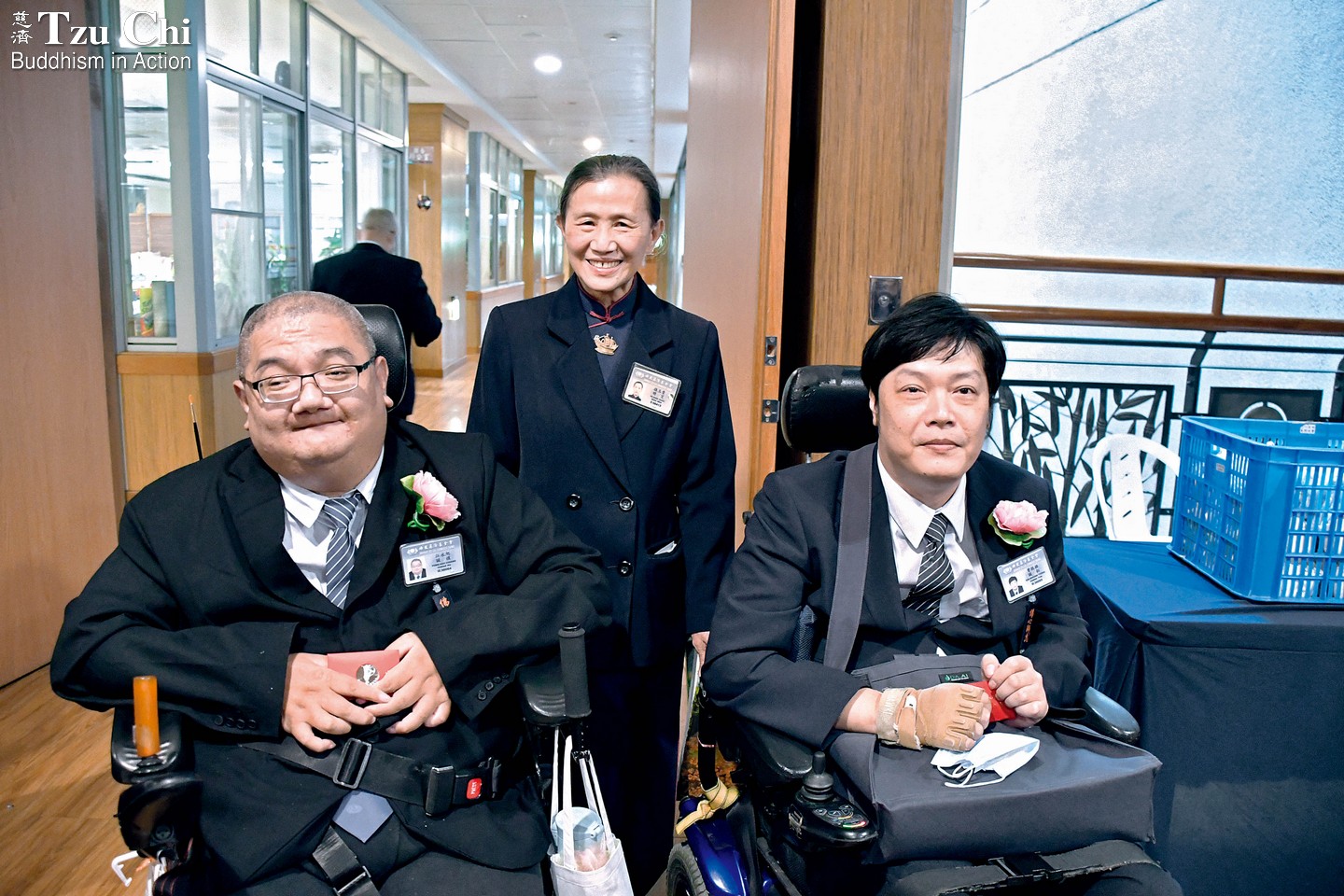
Zeng Qi-xiong (right) and Jiang Yong-xu (left), both spinal injury patients, received their Tzu Chi volunteer certifications in November 2021. Volunteer Sun Yu-gui (middle), who has provided care for them for years, wished them the best. Shi Long-wen
Tears and blood
Zeng Qi-xiong was raised by his grandma. When he was 22, he was on his way to work at a construction site when he was involved in a traffic accident, suffering a cervical spine injury. Paralyzed from the neck down, his life was derailed in an instant. In order to raise money to treat him, his father, Zeng Ze-qing (曾澤清), sold the house they were living in and their ancestral home. Despite valiant attempts at rehabilitation, Qi-xiong made little progress. He and his father were so distressed at the lack of progress they wanted to take their own lives.
When their money was all gone, Ze-qing moved with his mother and son from Taipei, northern Taiwan, to a rental in Taichung, central Taiwan. That was in 2003, two years after the traffic accident. To help his son acquire a skill, Ze-qing arranged for Qi-xiong to begin learning computer-aided design (CAD). During that time, Ze-qing had to take care of not only his son but also his mother, who was succumbing to dementia. All of this was on top of having to be the breadwinner to support his family. He was burning the candle at both ends.
The family’s situation was eventually brought to Tzu Chi’s attention. Volunteers visited the family to determine how the foundation could help. Sun Yu-gui (孫玉貴), one of the volunteers, had never been assigned to care for a paralyzed person before. She vividly remembered the first time she saw Qi-xiong. He was almost completely immobilized from the neck down. Though he could still move his hands a little, they weren’t strong enough to grip anything. He had to rely on his father for his daily needs, including getting dressed and changing his diapers.
“He is still so young,” Sun thought. “Will he have to spend the rest of his life confined to a bed?” She knew of some spinal injury patients who, after physical therapy, were able to take care of themselves. She hoped she could help the young man rebuild his life. Ze-qing, however, didn’t take well to the volunteers’ intentions to help. He felt his family could get by on their own strength and so he turned down the foundation’s offer of financial aid. He told the volunteers his son had been learning CAD for some time, and that as long as he could find work, he’d have no problem supporting himself. Later, when the volunteers came to their house for a visit, he’d leave to avoid having to see or talk to them.
Sun and her fellow volunteers persisted though. They kept up their visits and continued to show their care for Qi-xiong. Their persistence eventually won the father over. A visit on a Chinese New Year’s Eve, an important time for family gatherings, moved Ze-qing so much that he stopped leaving his home to avoid them. He still refused to accept Tzu Chi’s financial assistance, but he had at least opened his heart to the volunteers’ care and support.
Sun’s son happened to work in the field of computer-aided design, so she asked him if he could give Qi-xiong any help. He gifted Qi-xiong some CAD tools and even promised to sub-contract work out to him. Qi-xiong worked hard and successfully obtained four professional licenses. Sadly, his hands were still too weak to manipulate the computer input devices required for CAD, so he eventually was forced to give up trying to make a living in this field.
Sun felt really bad for Qi-xiong, that a possible way out had turned out to be a dead end for him. She racked her brains trying to think of how else she could help him.
One time, she and her fellow volunteers went to visit the family again. They repeatedly knocked on the door but received no response, even though they seemed to hear some indistinct sounds made by Qi-xiong’s grandmother through the door. Anxious that something untoward might have happened, they felt they had no choice but to ask a locksmith to come and open the door for them. After they entered, they learned that Ze-qing had passed out after throwing up blood, but had eventually regained consciousness and left for the hospital on his own, leaving Qi-xiong and his grandma shut up inside. Now Sun became deeply worried about the family. She urged Qi-xiong to face up to the fact that his father wouldn’t be able to take care of him forever.
Ze-qing was diagnosed with a duodenal ulcer. He was also at the time suffering from a medical condition called facial nerve paralysis. Qi-xiong had a rude awakening. He decided that he really needed to pull himself together and work harder to become independent instead of continuing to be a burden on his father. He picked up the pace of his physical therapy, and eventually he was able to turn himself and get out of bed unassisted.
Taking a suggestion made by friends, he decided to give painting a try. Since his hands were powerless to wield a paintbrush, he practiced by holding a brush or palette knife in his mouth. Ruan Li-ying (阮麗英), a painting teacher, started by teaching him the basics. A lot of sweat and blood was involved in Qi-xiong’s artistic journey. Without the use of his arms, he had to use brushes with extra-long handles so that he would not have to lean his neck and upper body too far forward to reach the canvas. His father used a bamboo chopstick to make a brush longer, but when Qi-xiong bit on it and turned it to paint, it sometimes pricked his mouth, causing lesions.
Qi-xiong kept at it and didn’t give up, but despite his best efforts, he began to wonder whether all his work was worth it. He wondered if he even had a talent for painting. His works always looked dark and cheerless.
Sun thought of enlisting the help of a famous mouth painter named Xie Kun-shan (謝坤山). She hoped he could give Qi-xiong some encouragement and share a few pointers with him. At her invitation, Xie called on Qi-xiong, and followed up with two more visits. He shared his life story with Qi-xiong, taught him to distinguish between warm and cool colors, and suggested he hone his skills by drawing still lifes. Qi-xiong forged ahead, and his hard work paid off. Eight years after he began painting, he was admitted into the Association of Mouth and Foot Painting Artists of the World, and began receiving a regular subsidy for buying pigments.
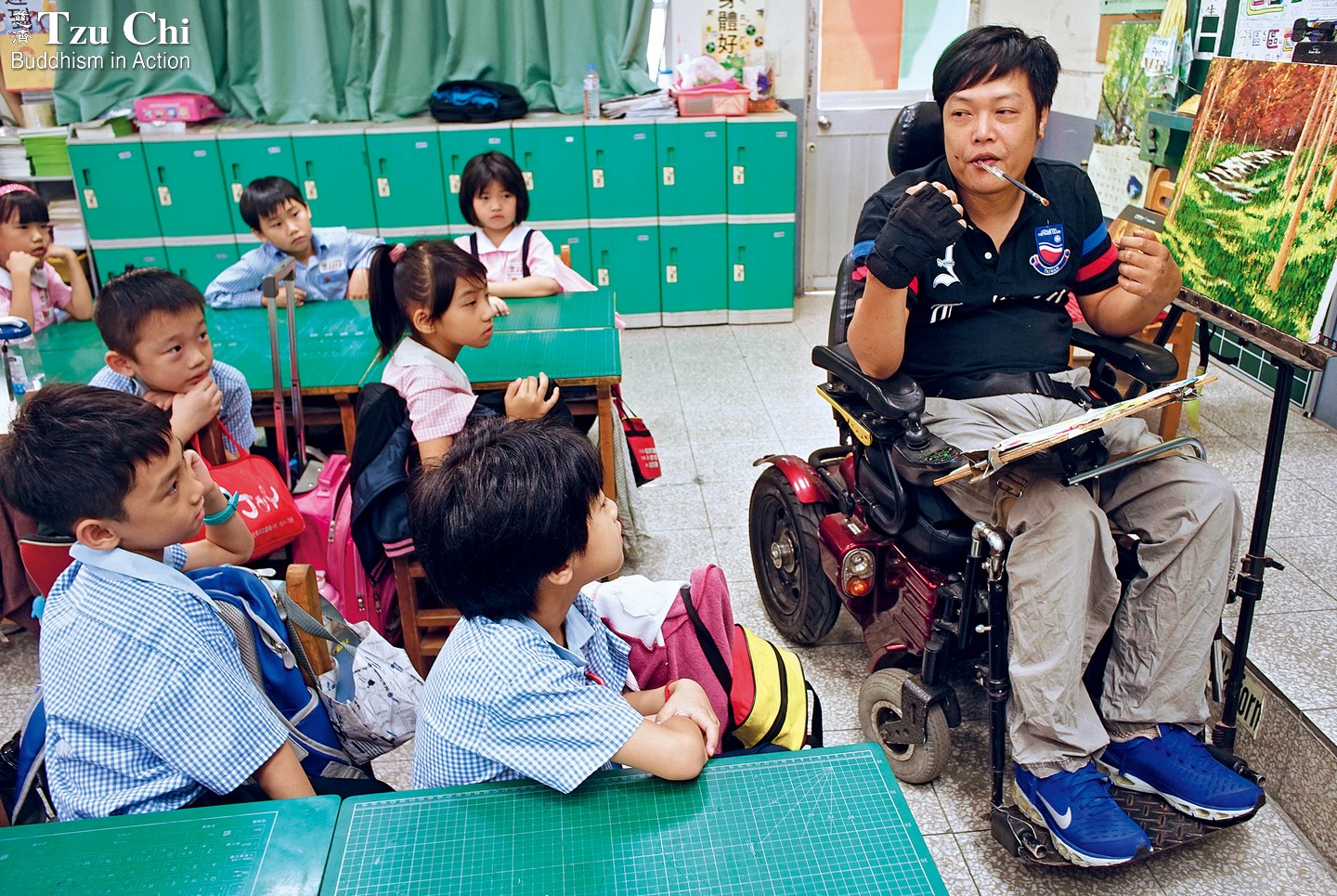
Zeng Qi-xiong shares his life story with schoolchildren to help them realize that everyone has unlimited potential. Lin Yan-huang
Confined to bed for 15 years
In 2015, Sun was asked to provide care for another spinal injury patient. When she saw the photos of Jiang Yong-xu, his legs covered in sores, her heart ached so much she couldn’t sleep that night. She tried very hard to think of what she could do to help him.
On her first visit to Yong-xu’s home, she saw him lying in a bed in the living room. His legs, which had lost all feeling, were completely stiff, and they would start to bleed with the slightest movement. They were in such bad shape due to lack of activity and poor circulation. His toenails dropped off at a touch. The application of topical medicine hadn’t helped.
Yong-xu had been cared for by his parents, who also needed to baby-sit their three young grandchildren. Yong-xu’s mother even needed to do odd jobs to help support the family. With their hands full, it was beyond them to take Yong-xu out regularly for medical attention. Sun said to the family after learning of their plight, “It’s okay. Since you can’t take Yong-xu out, let’s ask a doctor to come visit.”
Sun requested help from Taichung Tzu Chi Hospital. Superintendent Chien Sou-hsin (簡守信) personally visited Yong-xu and cleaned and dressed his sores. Medical professionals from the hospital continued to visit after that and taught Yong-xu’s parents how to care for his sores. Sometimes they even visited after work to chat with Yong-xu. Yong-xu and his family were surprised, saying, “You guys work really hard, don’t you?”
Yong-xu recalled how he had become paralyzed at age 19 after falling from a high place at work and sustaining an injury to his cervical spine. He hit rock bottom after the accident, feeling that he was done for. His legs gradually became so stiff he couldn’t even sit in a wheelchair. When Sun first visited him in 2015, he had been confined to his bed for 15 years.
In addition to treating his legs, people from Taichung Tzu Chi Hospital arranged for Yong-xu to receive physical therapy at the hospital. Dr. Cai Sen-wei (蔡森蔚), a physiatrist, visited Yong-xu’s home to determine if they needed to help create a barrier-free environment so that it’d be easier for Yong-xu to leave his home and go to the hospital for regular physiotherapy sessions. Afterwards, Yong-xu was hospitalized for a week for treatment on his leg sores and for rehabilitation. He was also given a power wheelchair to help him move around.
Sun encouraged him to work hard at his physical therapy so that he could regain some of his physical functions. Given the stiffness of his body, he made slow progress, and it was easy to get disheartened. To cheer him on, Sun asked Qi-xiong for help. “He had lain in bed for more than ten years,” she said to Qi-xiong. “I hope you can visit him. Maybe you can help light a spark within him.”
Qi-xiong visited him as requested. Yong-xu was surprised when he learned that Qi-xiong, a spinal injury patient like him, had driven a car to see him. “How can this man get around so easily on his own?” Yong-xu thought to himself. His mother was surprised too, asking, “Can he really drive?”
“He sure can,” Sun said. “And Yong-xu is younger than he. I believe he might be able to drive in the future too.”
The two men had a great time with each other. Yong-xu was so encouraged to see a quadriplegic like him move around so independently and even able to help support his family he decided to do his best at rehabilitation and be a good patient. In addition to treatment with Western medicine, he received acupuncture to complement his physiotherapy.
Since Yong-xu’s parents were getting on in years, Sun began thinking it was important for him to learn to make a living. She encouraged him to take up painting like Qi-xiong. As it turned out, Yong-xu was quite talented. Three years after he began drawing with his mouth, Chang Gung Memorial Hospital started collecting his works and providing him a regular income. Superintendent Chien Sou-hsin was so happy for him. Yong-xu is now able to support himself with his paintings and by selling dried fruits. His life is once again imbued with possibilities.
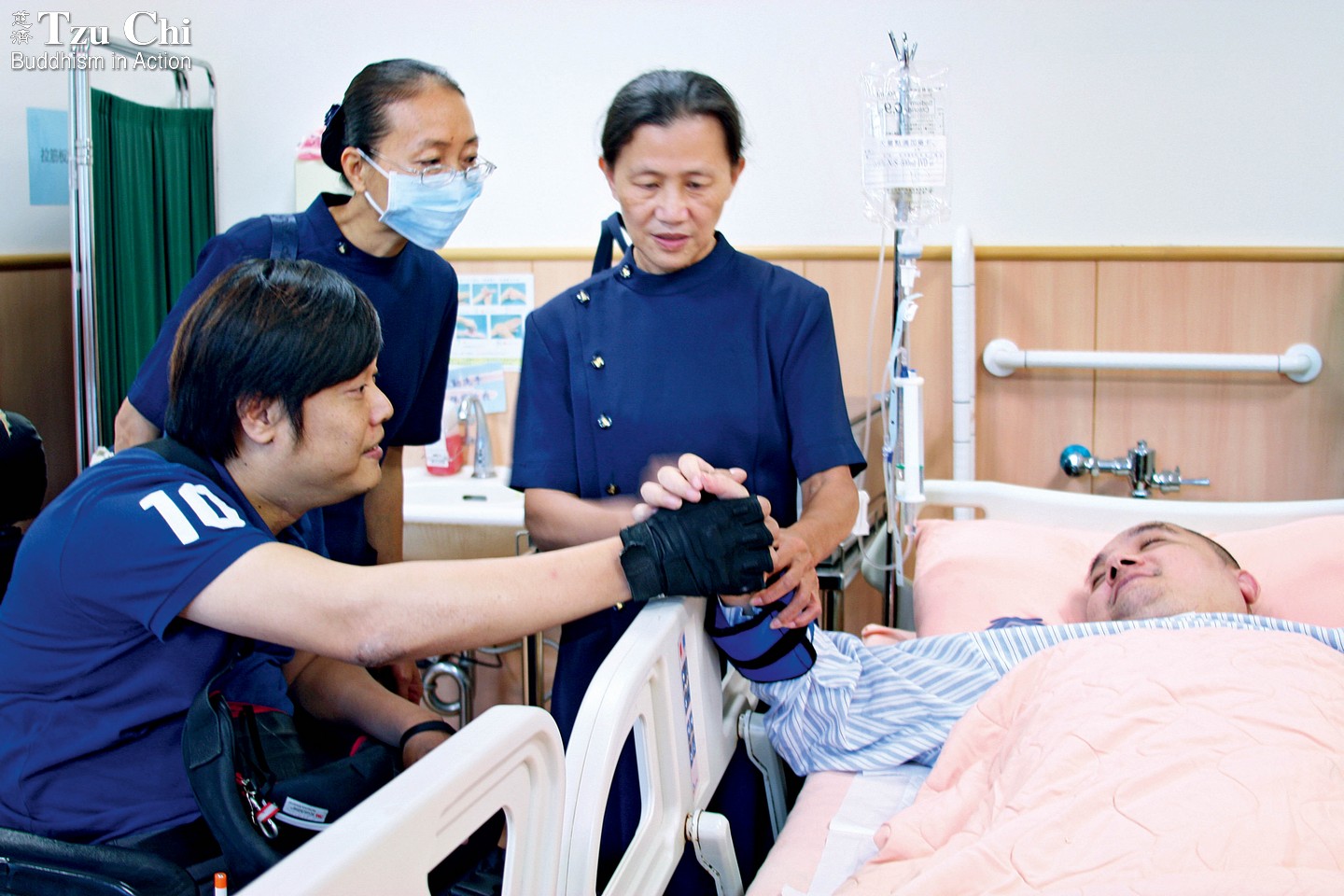
Zeng Qi-xiong visits Jiang Yong-xu at his bedside to cheer him on. Zeng Xiu-ying
Embarking together on the Bodhisattva Path
Qi-xiong and Yong-xu got to know each other because of their spinal injuries. They became good friends and even embarked together on the Bodhisattva Path.
“During those years when I was bedridden,” Yong-xu remembered, “I was like a prisoner powerless to break free from the walls that confined me. All I did every day was eat and wait to die. I lashed out at my family when my spirits were low, and all words of encouragement fell dead on my ears.” He was therefore deeply grateful to Tzu Chi for helping light shine into his life again.
At the encouragement of Superintendent Chien, Yong-xu started training in 2020 to become a certified volunteer. Qi-xiong signed up for volunteer training at the encouragement of Sun too. The two of them attended training classes, including online ones when physical classes were cancelled due to the coronavirus pandemic. They also took part in home visits to the needy. They even went to schools to share their life stories—they wanted to encourage others to not be defeated by life’s tribulations.
“I’ve received so much encouragement and such good care from Sun and other volunteers along the way,” said Qi-xiong. “I know full well the efforts put in by Tzu Chi to help the needy, and was inspired to join their ranks.” He explained that he had wanted to train to be certified over ten years ago. “I hoped to one day be able to help others, to visit and care for disadvantaged or sick people, and to contribute what little strength I have.”
His eyes welled up with tears when he received his certification from Dharma Master Cheng Yen. “Previously, my circumstances were such that I couldn’t fulfill my wish to train and be certified. Now my wish has finally come true! People like me have our limitations—we cannot get around as freely as others, but maybe we will be more convincing when it comes to offering encouragement to people who are ill, injured, or have limited mobility because we have similar experiences. That gives us an advantage over able-bodied people.”
“My hope for life was reignited,” Yong-xu said. “Now I want to bring my light to more people. I will pay forward the love Tzu Chi volunteers have given me.”
Stepping into a new phase in their lives, they are out to spread love and continue the cycle of goodness.
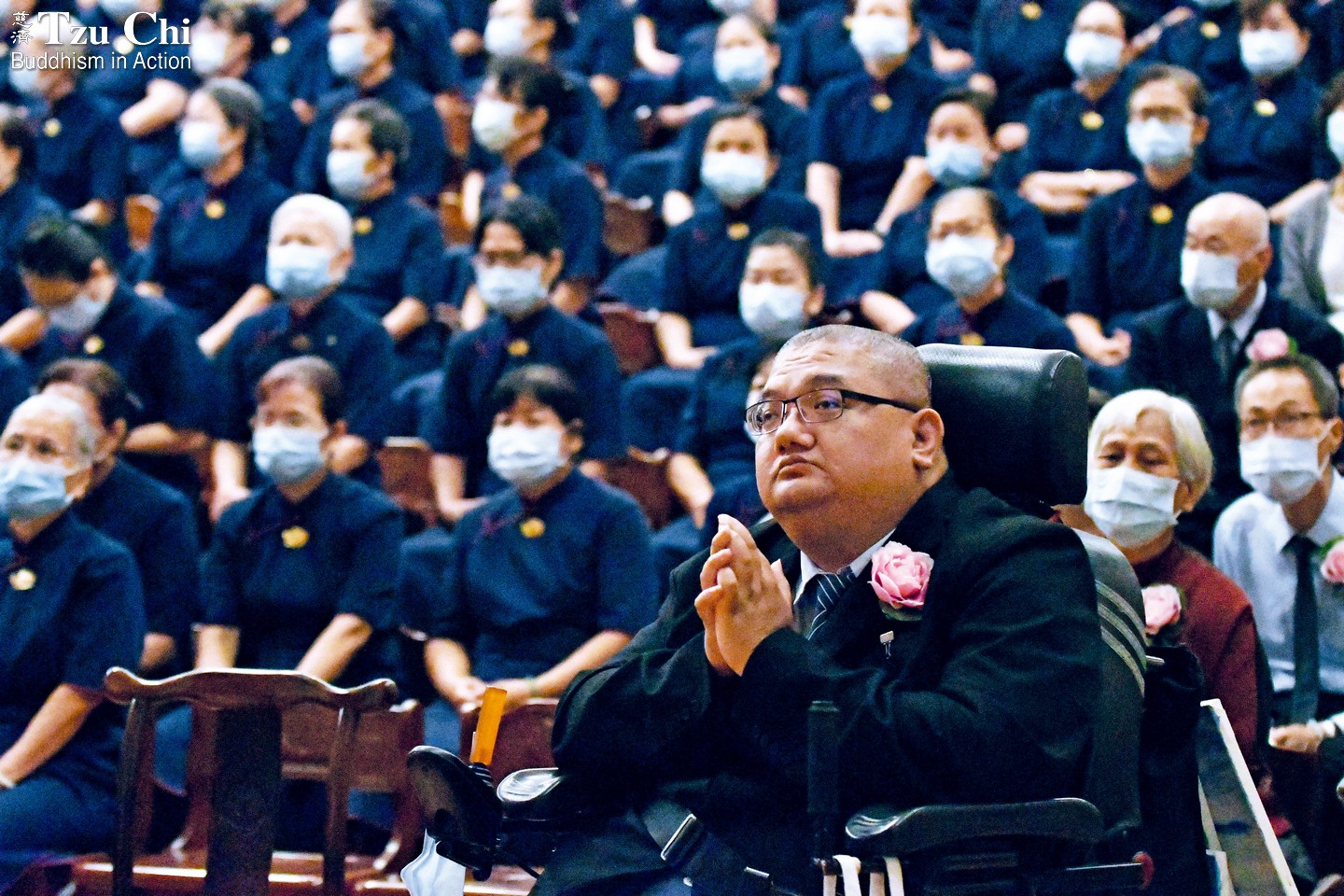
Looking back on his journey from a bedridden quadriplegic to a Tzu Chi volunteer, Jiang Yong-xu is full of gratitude to everyone who has helped him along the way. You Guo-lin
It was a joyful, emotional moment for me when I became Master Cheng Yen’s disciple. I’ve received the help of so many kind people. I’ll do like other Tzu Chi volunteers and contribute what I can.
—Zeng Qi-xiong
I’m full of thanks to Superintendent Chien and Tzu Chi volunteers for encouraging me to train to become a certified Tzu Chi volunteer. I hope I can inspire people with disabilities like me to never bow to fate and to bravely rise to challenges.
—Jiang Yong-xu

